When you set a publication date for your book, you can’t really anticipate that a demented maniac would have set the world’s richest man and a team of junior tech bros on the task of tearing apart a nearly 250-year-old system of government, and seeming to be pretty successful at it.
For sure, we knew that a 2nd Trump presidency was possible when February 4th, 2025 was chosen for the publication date of More Than Words: How to Think About Writing in the Age of AI, but you do not anticipate exactly this because how could you? It’s all more scary and more stupid than you could imagine.
It is demented and dementing and it is difficult not to feel entirely unmoored from reality, but of course, this is part of the strategy, to the extent there is a strategy, which there isn’t. We are in the land of impulse now, impulses coming from manifestly unfit and dangerous people.
I don’t know what to do about all the above beyond staying informed, and exerting my (extremely limited) power and influence where I’m able. I cannot directly protect the specific functions of our democracy, but what I can do is my work, work which I think has a clear relationship to our ability to be free and free-thinking people.
Donald Trump wants us to be confused and afraid. The tech industry thinks we’re dumb and should stay that way.
When you write a book, because of the realities of a book’s production, you have many months to keep thinking about what’s in the book after the book itself is a fixed object. For this reason, I often hesitate reading my books after they’re published in order to ward off any regrets over what’s missing. But on a recent flight home from a work trip I cracked open a copy of More Than Words and started reading and, my friends, I was very pleased at what I saw.
While there is a handful of things that I would like to adjust where subsequent events have provided additional clarity, overall, I think the book talks a lot of sense, while being highly readable, even entertaining. I’d forgotten how much of my own biography infuses the argument, and there’s some good stories in there.
Unlike the tech broligarchs who can publish books that serve primarily as infomercials, knowing that they will be paid attention to because of their wealth and their station, the rest of us have to write the best book we can in order to interest readers in engaging with our ideas.
In this incredibly strange and unsettling moment, I feel…dare I say it…proud of myself for having done exactly that. I’ve made the best book I can at this time.
It may seem strange in a newsletter post meant to promote my new book and encourage people to buy it to do what I’m about to do - which is recommend a bunch of other books - but I think this is keeping in the spirit not just of this newsletter, but also of what I’m trying to convey in More Than Words.
Large language models like ChatGPT have swallowed unfathomable amounts of text to then spit it back at us through probabilities. In significant contrast, human reading and writing is a process of exchange between unique intelligences. The material that allowed me to write More Than Words is significantly rooted in my reading, and I want to honor that by recommending some of the books that have informed this work.
As I wrote down all the books I’d like to mention, it became clear that there were far too many for a single newsletter post, so as the proprietor of this newsletter, I’ve made an executive decision to split this into three posts on three consecutive days.
Tuesday: Books by people who blurbed my book.
Wednesday: Books that I directly draw from in my book.
Thursday: Books I may not quote specifically, but which are foundational to the existence of my book.
Maybe this is all indulgent, but it’s not every day (or week, or year) I have a new book, so why not prolong the fun?
Books by My Blurbers
I can be cynical about the role book blurbs play in the publishing ecosystem, but I can say that all of the folks who were generous enough to endorse More Than Words were chosen because I first respect and benefit from their work. In some cases, I’ve cited their work directly in the book, but in every case, their work has shaped my world view.
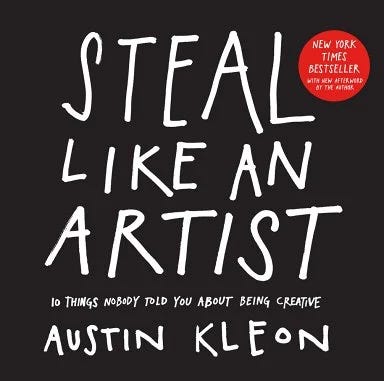
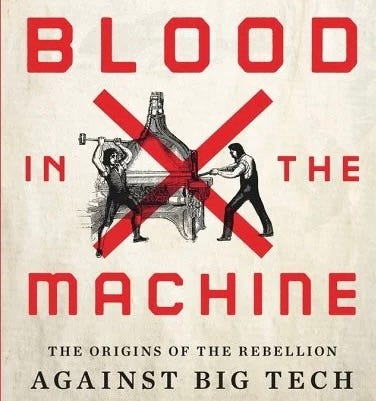
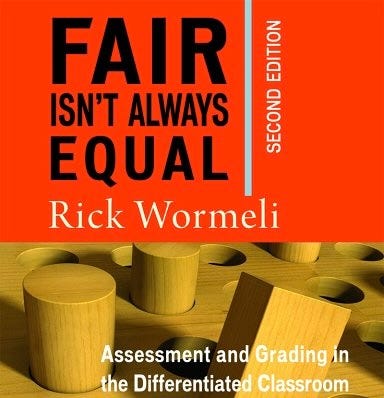
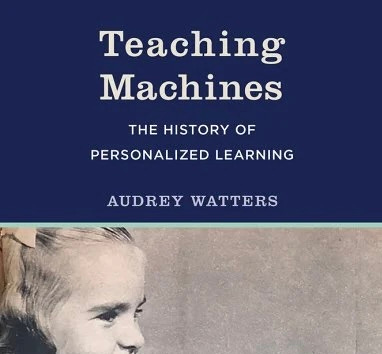

I literally picked up Steal Like an Artist by
years ago, maybe not long after it was published, on a whim, drawn in by the title and cover. Inside is a book of advice, but more important is that it’s a book of philosophy, a way of orienting yourself around your work that immediately resonated with me. I started using it with my students right after that and have found its spirit infused in my day-to-day writing ever since.’s Blood in the Machine: The Origins of Rebellion Against Big Tech was on my radar for months, but I hadn’t read it until I started working on the proposal for More Than Words and figured I should see what’s doing. It quickly informed one of the backbone arguments of my book, that preserving human agency in the face of technological change is a worthy and necessary thing.I don’t know how many books Rick Wormeli has published - Dozens maybe? - but for as long as I have been thinking about teaching, he has been a model for seeing teaching and learning as a problem to be worked where the needs of humans are put first. Fair Isn’t Always Equal is an effort to work through the challenges of assessment in a world where everyone is different.
No one is better than
when it comes to thinking about the intersection of technology and the lives we live. Teaching Machines is focused on the long history of the intersection of tech and school, but she’s now going both deeper and broader at her indispensable Second Breakfast newsletter.I had a hard time choosing which of James Lang’s books to represent him in this list. I went with Cheating Lessons: Learning from Academic Dishonesty because it provided a model for my previous book Why They Can’t Write: Killing the Five-Paragraph Essay and Other Necessities by showing that extending curiosity toward students’ choices can help reveal better ways of helping them learn.
You can’t pre-order More Than Words: How to Think About Writing in the Age of AI anymore because now it’s just an order! Here’s what Austin Kleon has to say.
If you’re on the fence about the book, maybe this review from
will push you one way or another.To see the rest of the blurbs and to find links to order from your favorite major bookseller, you may click the link below.
Thank you for your support and attention and please enjoy the book’s theme song on your way out:
All best,
John Warner
The Biblioracle

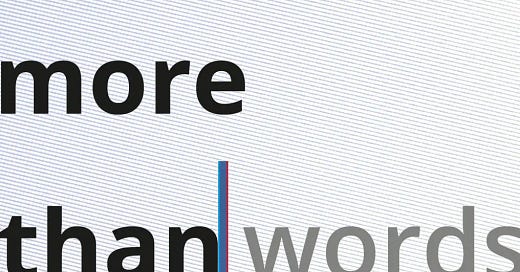




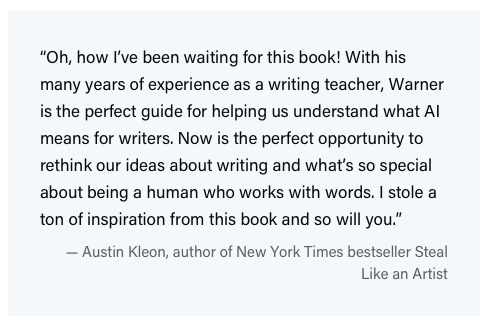

Congratulations! I'm also looking forward to reading it. I recommended it as a purchase to my public library and they ordered three copies.
Dear Dr. Warner,
I just finished your splendid book. Thank you for writing it.
I would appreciate the chance to exchange opinions with you directly. My email is bparrott@jhu.edu. Please contact me there.
Thanks again for writing your insightful book.
Best wishes,
Bruce Parrott
Professor Emeritus, Johns Hopkins School of Advanced International Studies